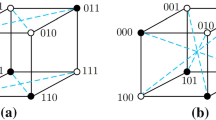Abstract
Partitioned Optimal Passive Stars network, POPS(d,g), is an optical interconnection network of N processors (N=dg) which uses g 2 optical passive star couplers. The processors of this network are partitioned into g groups of d processors each and the g 2 couplers are used for connecting each group with each of the groups, including itself. In this paper, we present an optimal embedding of the hypercube on this network for all combinations of values of d and g. Specifically, we show how to optimally simulate the most common hypercube communication pattern where each hypercube node sends a packet along the same dimension. Optimal simulation of this communication on the POPS(d,g) network has already been presented for d ≤ g in the literature, but for the case d> g, the optimality remained an open problem. Now, we show that an optimal simulation is feasible in this case too.
This work was supported in part by the European Union under the FET IST project CRESCCO.
Chapter PDF
Similar content being viewed by others
Keywords
These keywords were added by machine and not by the authors. This process is experimental and the keywords may be updated as the learning algorithm improves.
References
Gravenstreter, G., Melhem, R.G., Chiarulli, D., Levitan, S., Teza, J.: The Partitioned Optical Passive Stars (POPS) Topology. In: Proceedings of the Ninth International Parallel Processing Symposium, pp. 4–10 (1995)
Gravenstreter, G., Melhem, R.G.: Realizing Common Communication Patterns in Partitioned Optical Passive Stars (POPS) Networks. IEEE Transactions on Computers 47(9), 998–1013 (1998)
Melhem, R.G., Gravenstreter, G., Chiarulli, D., Levitan, S.: The Communication Capabilities of Partitioned Optical Passive Star Networks. In: Li, K., Pan, Y., Zheng, S. (eds.) Parallel Computing Using Optical Interconnections, pp. 77–98. Kluwer Academics Publishers, Dordrecht (1998)
Sahni, S.: The Partitioned Optical Passive Stars Network: Simulations and Fundamental Operations. IEEE Transactions on Parallel and Distributed Systems 11(7), 739–748 (2000)
Sahni, S.: Matrix Multiplication and Data Routing Using a Partitioned Optical Passive Stars Network. IEEE Transactions on Parallel and Distributed Systems 11(7), 720–728 (2000)
Datta, A., Soundaralakshmi, S.: Summation and Routing on a Partitioned Optical Passive Stars Network with Large Group Size. IEEE Transactions on Parallel and Distributed Systems 14(12), 1275–1285 (2003)
Mei, A., Rizzi, R.: Routing Permutations in Partitioned Optical Passive Stars Networks. In: Proceedings of the IEEE International Parallel and Distributed Processing Symposium (IPDPS 2002) (April 2002)
Berthome, P., Ferreira, A.: Improved Embeddings in POPS Networks through Stack-Graph Models. In: Proceedings of the Third International Workshop on Massively Parallel Processing Using Optical Interconnections, pp. 130–136 (1996)
Mei, A., Rizzi, R.: Mapping Hypercube Computations onto Partitioned Optical Passive Star Networks. In: Pinkston, T.M., Prasanna, V.K. (eds.) HiPC 2003. LNCS (LNAI), vol. 2913, pp. 95–104. Springer, Heidelberg (2003)
Mei, A., Rizzi, R.: Routing Permutations in Partitioned Optical Passive Stars Networks. Journal of Parallel Distributed Computing 63(9), 847–852 (2003)
Leighton, F.T.: Introduction to Parallel Algorithms and Architectures: Arrays-Trees-Hypercubes. Morgan Kauffman Publishers, San Mateo (1992)
Author information
Authors and Affiliations
Editor information
Editors and Affiliations
Rights and permissions
Copyright information
© 2005 Springer-Verlag Berlin Heidelberg
About this paper
Cite this paper
Kaklamanis, C., Konstantopoulos, C. (2005). Optimal Embedding of the Hypercube on Partitioned Optical Passive Stars Networks. In: Cunha, J.C., Medeiros, P.D. (eds) Euro-Par 2005 Parallel Processing. Euro-Par 2005. Lecture Notes in Computer Science, vol 3648. Springer, Berlin, Heidelberg. https://doi.org/10.1007/11549468_104
Download citation
DOI: https://doi.org/10.1007/11549468_104
Publisher Name: Springer, Berlin, Heidelberg
Print ISBN: 978-3-540-28700-1
Online ISBN: 978-3-540-31925-2
eBook Packages: Computer ScienceComputer Science (R0)




